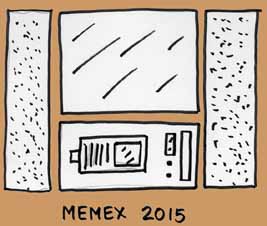


OVERVIEW
"[W]e are being bogged down today as specialization extends. The investigator is staggered by the findings and conclusions of thousands of other workers -- conclusions which he cannot find time to grasp, much less to remember, as they appear. Yet specialization becomes increasingly necessary for progress, and the effort to bridge between disciplines is correspondingly superficial." -- Vannevar Bush, 1945.
In his 1945 essay "As We May Think," Vannevar Bush proposed a solution to the information overload that was beginning to overwhelm the sciences: the Memex. Using a Memex, a scientist would be able to store, organize, and quickly recall vast amounts of information. The Memex would allow the scientist to make what Bush called "associative trails," which would link strings of seemingly disparate data together and thus aid the scientist in finding new connections in nature or history.
More than fifty years later, the information overload that was swamping the physical and human sciences has advanced to swamp all areas of life. It has been observed that a person can get more information from a random Sunday New York Times than a pre-Gutenberg peasant would get in an entire lifetime. How can anyone keep up?
This problem of comprehension will only grow during the next few decades. By 2015, the United States will be a digital culture and digital economy, in which text, sound, and video are available (and can be copied an infinite number of times) in files of ones and zeroes. Increases in computer speed, computer capacity, compression technology, and available bandwidth will make every book written and every album or television show produced available on demand at home to whoever is willing to pay a small fee to download them.
In the following sections, I detail how the Memex 2015 will address this changing situation:
(Note: Many of my thoughts about the economic effects of digitization are derived from Digital Economy, a 1995 book by Don Tapscott.)